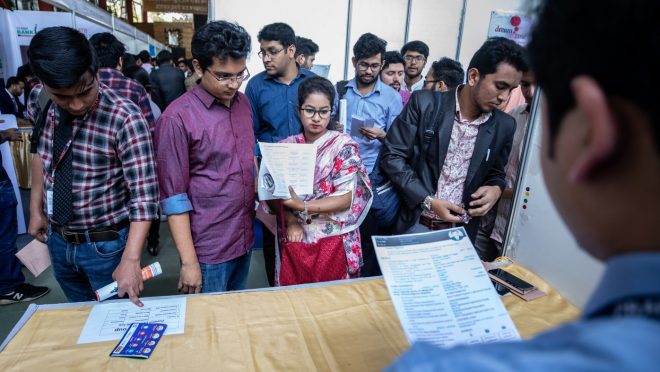How can we solve the job market struggles faced by Bangladesh's youth?
We should all work together to end youth unemployment. Our approach begins with making more people eligible for market-responsive, high-quality educational and vocational training programs
How can we solve the job market struggles faced by Bangladesh's youth?
We should all work together to end youth unemployment. Our approach begins with making more people eligible for market-responsive, high-quality educational and vocational training programs

Bangladesh’s high youth unemployment rate is more than a statistic; it is a sobering reality threatening the country’s future and dampening the youth’s hopes and dreams. Beyond the numbers, this problem reflects our youth’s unrealised potential. ILO estimated the unemployment rate of Bangladesh in 2022 to be 4.7%.
As we delve into the complexities of this issue, it is essential to remember that behind every number lies a story, every percentage hides a chance for progress, and every statistic represents a person.
Riya’s (pseudonym) story illustrates the hopes and problems of many members of her generation, because she is a recent college graduate. Riya has entered the workforce, optimistic that she can significantly impact our country’s growth and development.
But the world she entered vastly differed from her preconceived notions. Despite her qualifications and enthusiasm, Riya faced the terrifying prospect of protracted job searches, dashed aspirations, and the nagging question of whether her ambitions would ever come true.
The cycle of uncertainty and despair Riya is caught in is shared by countless other young Bangladeshis who cannot realise their potential or achieve their goals. These accounts are sobering reminders that youth unemployment is not just a number; it is a heartbreaking reality that demands our immediate attention and a deliberate community response.
To fully grasp the gravity of the issue posed by the youth unemployment rate, it is crucial to learn more about the lives of people like Riya. The emotional toll on young individuals looking for work and the economic repercussions is substantial. Constantly seeking opportunities and then facing setbacks can lead to a sense of disillusionment that can have lasting effects on one’s mental health.
A feeling of disillusionment can impair a person’s capacity to perform optimally. The weight of societal and familial expectations is another complication that adds to their difficulties.
Therefore, the most potent pillars in our fight against youth unemployment should be education and the acquisition of skills. We should consider how our youth can access new possibilities. We should realise that our child can only acquire the theoretical grounding and practical experience necessary in today’s job market through a well-rounded education.
According to a recent poll by Trading Economics, employees with specialised skills gained through formal education and training are given preference by employers.
Think about the life-changing potential of programs like those that provide vocational training. Take the example of Ahmed (pseudonym), a young guy who chose not to continue his education but benefited from a government-funded program that taught him welding and metallurgy.
With his newfound talents and abilities, Ahmed was able to land a job at a local manufacturing company and finally escape the cycle of unemployment that had held him back for so long.
Ahmed’s story is just one example of how vocational education can provide a future for our youth by helping them gain employment opportunities. To equip today’s youth with the tools they’ll need to thrive in tomorrow’s world, our nation’s schools, businesses and lawmakers must maintain their commitment to education and skill development.
Furthermore, examples of young Bangladeshis overcoming seemingly insurmountable obstacles by engaging in skill-building activities provide much-needed optimism. One such success story is that of Maryum, a recent high school graduate who attended a community-run freelancing camp and is now working as a software developer. The centre was her entry point into the industry.
Maryum’s story exemplifies the potential of today’s youth when given the resources and opportunities to pursue careers that are rewarding and consequential to the growth of our economy.
These examples show that education and skill development are not just ideological goals but the paths young people need to take to give them the agency they need to shape the country’s future for the better.
Vocational education is a powerful tool because it opens doors and helps people better their lives in ways that go beyond the primary acquisition of skills. To escape unemployment, young people in Bangladesh are taking opportunities to launch their businesses.
Consider the situation of Ayesha (pseudonym), a young woman from a remote village in Bangladesh who wanted to better herself by participating in a vocational training program in Mymensingh that focuses on agricultural business.
As a result of her education and experience, she decided to start a small organic agrarian operation. Ayesha can now provide for her loved ones and inspire others to work hard and achieve their goals. She is a shining example of the power of education.
CEO World magazine in New York released an Entrepreneurship Index 2021, with Bangladesh ranking #84 out of 100 economies. The proportion of young Bangladeshis who are self-employed has increased over the previous five years because of entrepreneurial programs.
Because of the complexity of the problem, no single organisation can effectively combat youth unemployment on its own. On the positive side, Bangladesh is experiencing a rise in collaborative efforts between government bodies, NGOs, and the private sector.
These collective efforts are already having a significant impact on the country. These cooperative efforts yielded positive outcomes, demonstrating the power of coming together to overcome adversity.
From a humanitarian perspective, we should all work together to make a concerted effort to end youth unemployment. Our multi-pronged approach begins with making more people eligible for market-responsive, high-quality educational and vocational training programs.
Statistics given by Trading Economics show that countries with robust skill training programs have seen a decrease in youth unemployment.
It is also crucial to foster an environment that inspires risk-taking and innovation. Regulatory processes must be simplified, financial incentives must be provided, and a culture that appreciates innovation must be enabled.
Collaborative efforts, such as mentorship programs linking seasoned businessmen with up-and-coming entrepreneurs, have helped foster a new generation of business leaders.
When navigating the murky waters of youth unemployment, it is essential to remember that there’s a silver lining to every cloud. Our youth are a treasure trove of untapped potential with vitality, creativity and resiliency.
By working together, we can realise Bangladesh’s full potential and provide the country with a brighter future. In this imagined future, youth unemployment is a thing of the past, and success stories like Ayesha’s and those resulting from collaborative efforts are the norm. Our nation’s youth are its most significant asset, and together, we can usher in an era of empowerment, growth, and fulfilment.

Dr Mohammad Shahidul Islam is an Assistant Professor of Marketing at BRAC Business School, BRAC University.


